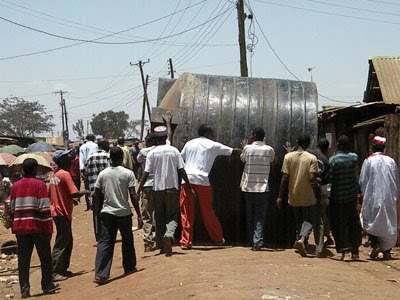Kenya, in many ways, mirror what Myanmar/Burma is. Or at least what it was like during my childhood. The roads here are not well maintained, and are full of potholes, if they are cemented at all. Most of these roads, even those in the city would have you walk in a cloud of dust, when a car or a lorry drives past you.
When I was young, I used to skip over the potholes on the pavements of Inya road, pretending that there were monsters; crocodiles and sharks in them. This afternoon, I was reminded of those times, as I took a walk in the neighbourhood where my school (SIT office building) is. During this time, I was looking down, cautious about not tripping on the uneven sidewalks. Along the way, I also noticed several little tuckshops that sold homecooked lunch meals, for less than a dollar. Although the food is served in utensils that were merely rinsed after use, the Kenyan staples of corn and maize flavored by the heat of the sun and the dust in the air serve to satisfy the hungry stomachs of the workers employed near by. They work as drivers, security guards, house helps, etc at the residences and office buildings in the neighbourhood.
I don't know how their wages are, but there is no doubt that they find it difficult to make ends meet. Yesterday, there was news about the slum upgrade, and the new apartments that the people are moving into (according to my host mom's translation), cost 1000 Kenyan Shilings a month for a room. That works out to about 13 US dollars a month or 44 cents a day. And many of them are still unable to afford that "luxury" of living in an apartment. Most of them choose to live in slums, one of which is Kibera, the largest slum in Africa, second largest in the world.
I had visited Kibera with 2 video journalist of the organization, Carolina for Kibera (an NGO that does a wonderful work in community development). My language limits the description, but what I saw was just simply heart-breaking. They live 3in1 rooms.
Just like the shacks in Guguletu South Africa, and the bamboo shelters in Hlaing Tha Yarr, Myanmar, many family share a room which is their bedroom, living room and kitchen. But Kenyan slums are in much worse condition. Water is a huge problem here, and many have to walk a distance or buy water for daily consumption. Ironically, places for human waste displosal are plenty, not because of the abundunce and accessibility of toilets, but because the residents of the slums can claim any open space to be one. (I saw a kid poop-ing right by the road side, in broad daylight, as a group of us walked by.
Kenya is also where they coined the term "flying toilets," when people just do their business in their rooms and throw out the plastic bags, too lazy to dispose off where it should be.) The streams and drainage systems are filled with rubbish, making floods abound during rainy season, (although Kenya has been short of rainfall in the past couple of years). Darkness fills their homes at night, because electricity is rationed unreliably. And when there is light, Kerosene smell fills the atomosphere.
And to the residents of the slums, the lives of the upper and middle income families, whose homes are in compounds guarded by electric fences, seem unreacheable. They are in contact with wealth and the wealthy on a daily basis, when they walk past these places that are just a stone-throw away from the slums, or when they step into their employers' offices/homes. I am sorry if I sound condesending, because I am not. I had lived their lives before, although not in conditions as bad as these residents were living.
I had lived a life, questioning why it was others, and not I, that enjoy wealth. It was like the 6-year old me, imagining how wonderful it might be to live in an American home, with a pretty lawn and grass flowers as I had seen in the movies; And how people cran their necks to look up at skyscrapers in HongKong. I also remember having a mixed feeling of anger, and jealousy, when my Primary 6 classmates decide to go out for a movie at the end of the week, as I walked home, wondering how it was that these Singaporeans could afford the Six dollar movie tickets, my lunch money for 3 weeks.
Now, as I walked passed the slums with comfortable shoes on my feet, a bottle of water on my back, and all the other things that I have taken for granted, I wonder what the children in the slums are thinking, when they call out, "how are you" or "mazungu (white person)".

Children of Kibera come from different ethnic backgrounds. To promote ethnic cohesion, and to prevent youths from going astray, Carolina for Kibera organizes tournaments.

The installation of the water tank that is going to be installed in the village in Kibera called Lindi. This project was initiated by the youth groups in Kibera.

A biofuel plant. A toilet that is being built to harness gas energy from human waste.





 SunriseIn the mornings, just before the sunrises over the baharini (ocean), the women would be out in the streets, sweeping or collecting coconut husks to start fire for chai.
SunriseIn the mornings, just before the sunrises over the baharini (ocean), the women would be out in the streets, sweeping or collecting coconut husks to start fire for chai.












